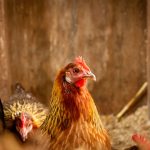Antibiotic-free chicken care is an emerging practice in poultry farming, driven by increasing consumer awareness of potential health risks associated with antibiotic use in animal agriculture. Conventional chicken farming often employs antibiotics for disease prevention, treatment, and growth promotion. However, this widespread use can contribute to the development of antibiotic-resistant bacteria, posing significant public health concerns.
In response to consumer demand for antibiotic-free products, many farmers are adopting alternative approaches to chicken care. The antibiotic-free method emphasizes natural and holistic practices to maintain chicken health and well-being. This approach includes providing proper nutrition, implementing preventative health measures, maintaining clean living environments, and utilizing natural remedies for common ailments.
By focusing on these aspects, farmers aim to reduce the need for antibiotics while producing healthier and more sustainable chicken products. Key components of antibiotic-free chicken care include:
1. Balanced nutrition to support immune function
2.
Improved sanitation and biosecurity measures
3. Reduced stocking densities to minimize stress and disease transmission
4. Use of probiotics and prebiotics to promote gut health
5.
Implementation of vaccination programs for disease prevention
6. Application of natural supplements and herbs for health maintenance
By adopting these practices, farmers can meet the growing demand for antibiotic-free chicken while contributing to efforts to combat antibiotic resistance in both animal and human populations.
Table of Contents
- 1 Proper Nutrition for Antibiotic-Free Chickens
- 2 Natural Remedies for Common Chicken Ailments
- 3 Preventative Measures for Antibiotic-Free Chicken Health
- 4 Importance of Clean Living Conditions for Antibiotic-Free Chickens
- 5 Alternative Health Practices for Antibiotic-Free Chickens
- 6 The Benefits of Antibiotic-Free Chicken Care
- 7 FAQs
- 7.1 What are some natural ways to keep chickens healthy without antibiotics?
- 7.2 What should be included in a balanced diet for chickens to keep them healthy?
- 7.3 How can good hygiene practices help in keeping chickens healthy without antibiotics?
- 7.4 What are some natural supplements that can help boost the immune system of chickens?
- 7.5 What are some common diseases in chickens and how can they be prevented without antibiotics?
Key Takeaways
- Antibiotic-free chicken care focuses on natural and holistic methods to promote chicken health and well-being.
- Proper nutrition is essential for antibiotic-free chickens, including a balanced diet of grains, seeds, fruits, and vegetables.
- Natural remedies such as herbal supplements, essential oils, and probiotics can be used to treat common chicken ailments without antibiotics.
- Preventative measures such as regular health checks, proper hygiene, and biosecurity protocols are crucial for maintaining antibiotic-free chicken health.
- Clean living conditions, including spacious and well-ventilated coops, are important for preventing disease and promoting the health of antibiotic-free chickens.
- Alternative health practices such as acupuncture, chiropractic care, and homeopathy can be used to support the health and wellness of antibiotic-free chickens.
- Antibiotic-free chicken care offers numerous benefits, including healthier chickens, reduced antibiotic resistance, and higher quality poultry products for consumers.
Proper Nutrition for Antibiotic-Free Chickens
Nutrient-Rich Feed for Antibiotic-Free Chickens
Antibiotic-free chickens should have access to a variety of high-quality feed that is free from antibiotics, hormones, and other additives. This may include a combination of grains, seeds, legumes, and other natural ingredients that provide essential vitamins, minerals, and protein.
The Importance of Fresh Water
In addition to a balanced diet, access to fresh water is also essential for antibiotic-free chickens. Clean water helps to regulate body temperature, aid in digestion, and support overall health. It is important for farmers to regularly clean and refill water containers to ensure that the chickens have access to clean and uncontaminated water at all times.
Supporting Health and Well-being without Antibiotics
By providing a nutritious diet and access to clean water, farmers can help to support the health and well-being of antibiotic-free chickens without relying on antibiotics to address nutritional deficiencies or related health issues.
Natural Remedies for Common Chicken Ailments

In antibiotic-free chicken care, natural remedies are used to address common ailments that may affect the health of the chickens. Instead of turning to antibiotics as a first line of defense, farmers can use natural remedies to support the chickens’ immune systems and help them recover from illness or injury. For example, herbal supplements and tinctures can be used to boost immune function and support overall health.
Garlic, oregano, and other herbs have been shown to have antimicrobial properties that can help to combat infections and promote healing in chickens. In addition to herbal remedies, holistic treatments such as acupuncture and chiropractic care can also be used to support the health of antibiotic-free chickens. These alternative therapies can help to address musculoskeletal issues, improve circulation, and promote overall wellness in the chickens.
By using natural remedies and alternative therapies, farmers can minimize the need for antibiotics while still effectively addressing common ailments and promoting the health of their chickens in a more sustainable and holistic manner.
Preventative Measures for Antibiotic-Free Chicken Health
Preventative measures are key to maintaining the health of antibiotic-free chickens and reducing the need for antibiotics. By implementing proactive strategies to prevent disease and promote overall wellness, farmers can minimize the risk of illness and the need for antibiotic treatment. This may include practices such as regular health checks, vaccination against common diseases, and biosecurity measures to prevent the spread of pathogens within the flock.
Furthermore, proper hygiene and sanitation practices are essential for preventing disease in antibiotic-free chickens. Clean living conditions, regular cleaning of coops and equipment, and proper waste management can help to reduce the risk of bacterial and parasitic infections. Additionally, providing adequate space and environmental enrichment for the chickens can help to reduce stress and support their overall health.
By taking proactive measures to prevent disease and promote wellness, farmers can reduce the reliance on antibiotics and support the long-term health of their antibiotic-free chickens.
Importance of Clean Living Conditions for Antibiotic-Free Chickens
Clean living conditions are essential for maintaining the health and well-being of antibiotic-free chickens. A clean environment helps to reduce the risk of disease transmission, minimize stress on the chickens, and support overall wellness. Proper coop management, including regular cleaning and disinfection, is crucial for preventing the buildup of pathogens that can lead to illness in the flock.
Additionally, proper waste management and ventilation are important for maintaining air quality and reducing the risk of respiratory issues in the chickens. Furthermore, providing adequate space and environmental enrichment for antibiotic-free chickens is important for promoting their physical and psychological well-being. Access to outdoor areas where they can engage in natural behaviors such as scratching, dust bathing, and foraging can help to reduce stress and support their overall health.
By prioritizing clean living conditions and providing a stimulating environment for the chickens, farmers can help to minimize the risk of disease and promote the health of their antibiotic-free flock without relying on antibiotics as a primary means of disease control.
Alternative Health Practices for Antibiotic-Free Chickens

Complementary Therapies for Chicken Health
Practices such as acupuncture, chiropractic care, and homeopathy can help to address musculoskeletal issues, improve circulation, and promote overall wellness in the chickens. These alternative therapies can be used as part of a holistic approach to chicken care, helping to support their physical and emotional well-being without relying on antibiotics as a first line of defense.
Reducing Stress and Promoting Relaxation
Furthermore, practices such as aromatherapy and massage can also be used to promote relaxation and reduce stress in antibiotic-free chickens. Stress reduction is important for supporting immune function and overall health in chickens, helping to minimize the risk of illness without relying on antibiotics as a primary means of disease control.
A Natural and Sustainable Approach to Chicken Care
By incorporating alternative health practices into their chicken care routines, farmers can support the long-term health and well-being of their antibiotic-free flock in a more natural and sustainable manner.
The Benefits of Antibiotic-Free Chicken Care
In conclusion, antibiotic-free chicken care offers numerous benefits for both farmers and consumers. By prioritizing natural approaches to chicken care such as proper nutrition, natural remedies, preventative measures, clean living conditions, and alternative health practices, farmers can produce healthier and more sustainable chicken products that meet the demands of conscientious consumers. Antibiotic-free chicken care helps to minimize the use of antibiotics in poultry farming, reducing the risk of antibiotic-resistant bacteria and supporting long-term human and animal health.
Furthermore, antibiotic-free chicken care promotes more holistic and sustainable farming practices that prioritize the well-being of the chickens and minimize environmental impact. By focusing on preventative measures and natural remedies rather than relying on antibiotics as a first line of defense, farmers can support the overall health and wellness of their antibiotic-free flock in a more sustainable manner. As consumer demand for antibiotic-free chicken products continues to grow, adopting more natural and holistic approaches to chicken care will become increasingly important for farmers looking to meet market demands while promoting animal welfare and sustainable farming practices.
If you’re looking for ways to keep your chickens healthy without antibiotics, you may also be interested in learning about the best kind of coop for your chickens. Check out this article for tips on choosing the right coop to provide a safe and comfortable environment for your flock. A well-designed coop can help prevent disease and promote overall health for your chickens.
FAQs
What are some natural ways to keep chickens healthy without antibiotics?
Some natural ways to keep chickens healthy without antibiotics include providing a clean and spacious living environment, offering a balanced diet, and implementing good hygiene practices.
What should be included in a balanced diet for chickens to keep them healthy?
A balanced diet for chickens should include a mix of grains, seeds, fruits, vegetables, and protein sources such as insects or mealworms. It’s important to provide access to fresh, clean water at all times.
How can good hygiene practices help in keeping chickens healthy without antibiotics?
Good hygiene practices such as regularly cleaning the coop, providing clean bedding, and keeping feed and water containers free from contamination can help prevent the spread of diseases and keep chickens healthy without the need for antibiotics.
What are some natural supplements that can help boost the immune system of chickens?
Natural supplements such as garlic, apple cider vinegar, probiotics, and herbs like oregano and thyme can help boost the immune system of chickens and support their overall health without the use of antibiotics.
What are some common diseases in chickens and how can they be prevented without antibiotics?
Common diseases in chickens include respiratory infections, coccidiosis, and parasites. These can be prevented without antibiotics by maintaining a clean living environment, providing a balanced diet, and practicing good biosecurity measures. Regular health checks and prompt treatment of any health issues are also important.
Meet Walter, the feathered-friend fanatic of Florida! Nestled in the sunshine state, Walter struts through life with his feathered companions, clucking his way to happiness. With a coop that’s fancier than a five-star hotel, he’s the Don Juan of the chicken world. When he’s not teaching his hens to do the cha-cha, you’ll find him in a heated debate with his prized rooster, Sir Clucks-a-Lot. Walter’s poultry passion is no yolk; he’s the sunny-side-up guy you never knew you needed in your flock of friends!







